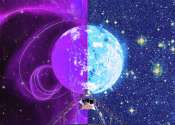While aiming for massive gas cloud, astronomers spot differences in thickness of Milky Way Galaxy
Space may appear vast and empty, but it's full of cosmological objects that are invisible to the human eye. From our vantage point on Earth, many of these objects fall between astronomers and what they hope to observe, impacting ...









